Review



In the Presbyterian way of doing things, members of the General Assembly formally elect the new Moderator during a service of installation – and so it was for Rt Rev Dr Trevor Gribben, the 179th person to hold the office.
His predecessor, Dr Richard Murray, led the service in front of ministers and elders from PCI’s 500-plus congregations across Ireland, during which Dr Gribben knelt before a packed Assembly Hall, as Dr Murray prayed for him. Overseas delegates from five countries were also present, as were civic guests, who included HM Lord Lieutenant for Belfast and the city’s Deputy Lord Mayor and High Sherriff.
In the public gallery were members of Dr Gribben’s family and other personal guests,
Assembly of the Presbyterian Church in Ireland 10-12 June 2025
Moving to an earlier slot in June, the Scrabo stoned walls of Assembly Buildings were bathed in summer sun throughout the three days of the 2025 General Assembly.
This year also marked two significant anniversaries for the Church and saw a change not witnessed in nearly 30 years.
Two thousand and twenty-five marked the 185th anniversary of the establishment of the Presbyterian Church in Ireland (PCI), and 120 years since Assembly Buildings opened. It was also the first time since 1997 that a Clerk of the General Assembly had presided as Moderator. All this and more can be found in The Review, as it seeks to provide an informative and useful snapshot of just some of what took place between 10-12 June.
including the Roman Catholic Archbishop of Armagh and Primate of All Ireland, the Most Rev Eamon Martin. To those in the Assembly Hall, and those watching online, he unveiled his theme for the year: ‘A hope and a future in Jesus’.
His theme and his address were taken from a well-known chapter in the Book of Jeremiah (29:1,4-14), where the Old Testament prophet had a direct message of hope for the Church and its people today.
Dr Gribben said that God called his people in Jeremiah’s day to seek the peace and prosperity of the city – as his followers are called to do today, and not to deviate from God’s Word, or succumb to deception, but be totally reliant on God –calling to him, praying to him, and seeking him.
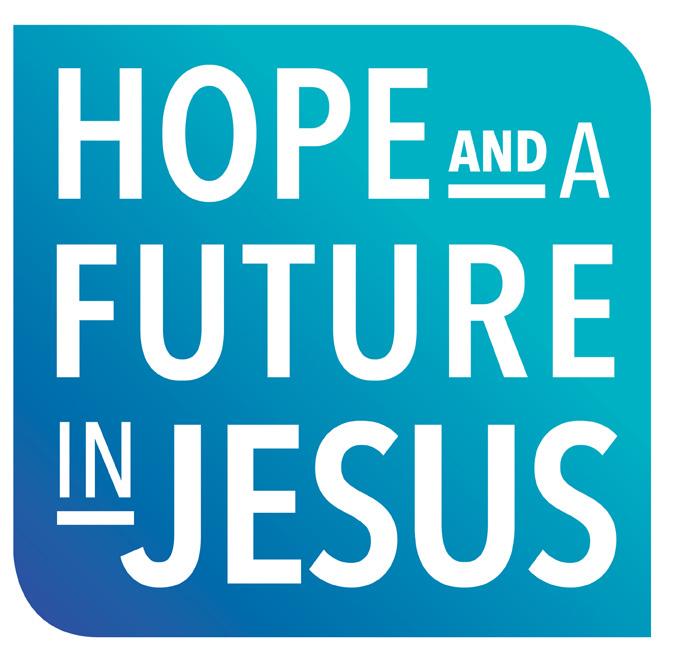
He named and praised many different professions serving the community, the emergency and voluntary services – even politicians – all who work for the common good. He also rubbished the notion that the Church was on the wrong side of history. “We have a hope and a future in Jesus Christ…and our calling is to proclaim it,” he said.
You can read more about Dr Gribben’s address here.
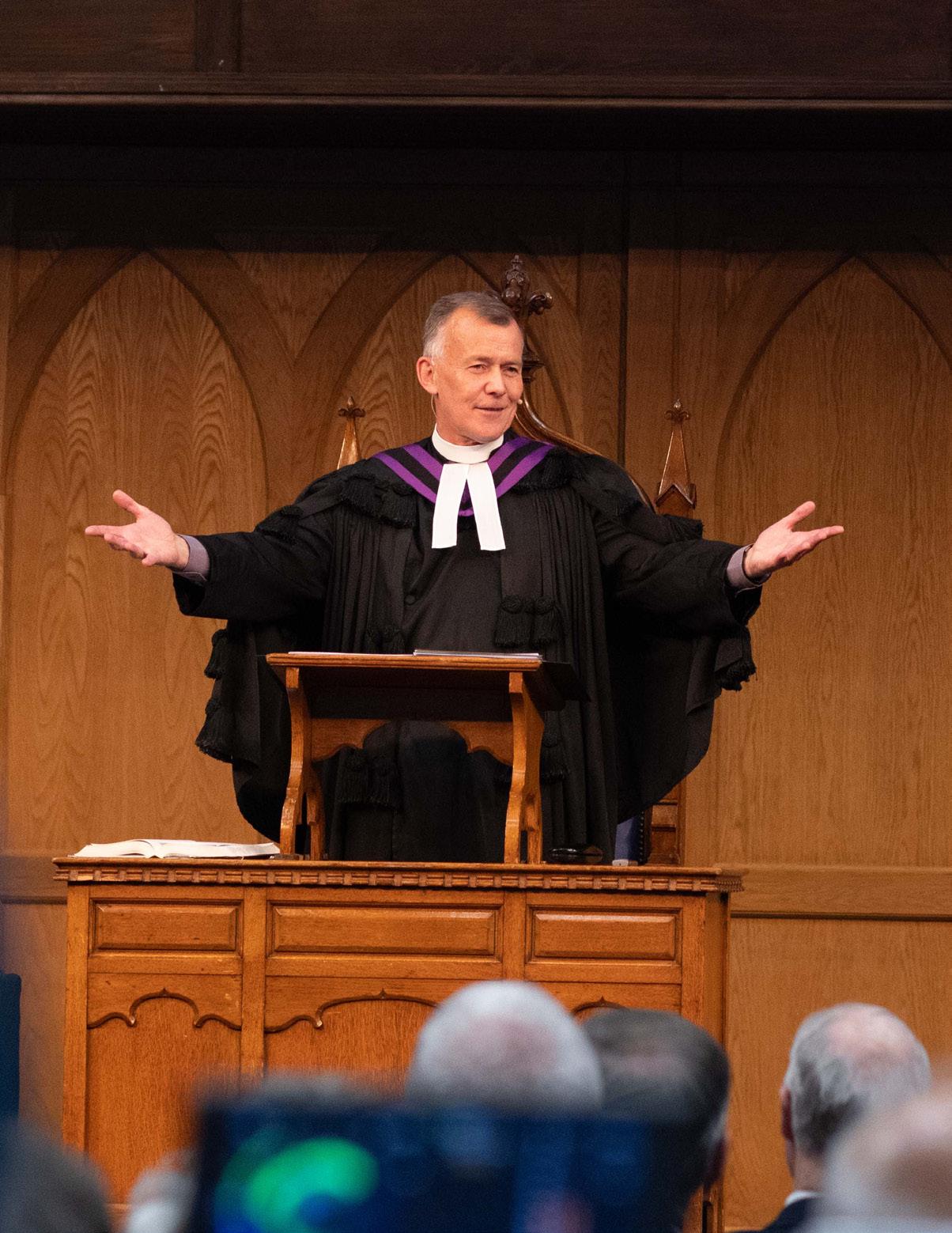
One of the major changes this year in the General Assembly, alongside the change in date, was not to have an Evening Rally. With decreasing attendances, it was felt that worship could be better incorporated into the timetable of the Assembly and by doing so, there would be increased opportunities for all members to engage in worship.
Worship sessions this year were held at the opening ceremony on Tuesday morning and again at 5:30pm; at the end of the morning session on Wednesday and again at the service of installation of the Moderator. The final session was the communion service on Thursday afternoon.
All these sessions were well attended with the praise and the messages at each being incredibly inspiring and uplifting. For any in the building the sound of many voices raised in worship will last long in the memory.
Throughout all the sessions of worship, there was a clear message, set by both the outgoing and incoming Moderators, that as a Church we worship a God who is mighty to save and who alone brings a hope and a future.
Having said prior to opening the General Assembly that during his year in office he had felt like an ‘itinerant preacher’, Dr Richard Murray, gave a powerful evangelical address when he opened the Assembly.
The outgoing Moderator encouraged the Church “not to be ashamed of the gospel in a world that wants to sideline us, to relegate us to private piety, to keep us quiet...”
At the same time, he reminded the annual gathering of Irish Presbyterians of Jesus’ words, when he said, “‘I will build my church and the gates of Hell will not prevail against it.”
You can read more of Dr Murray’s address here.
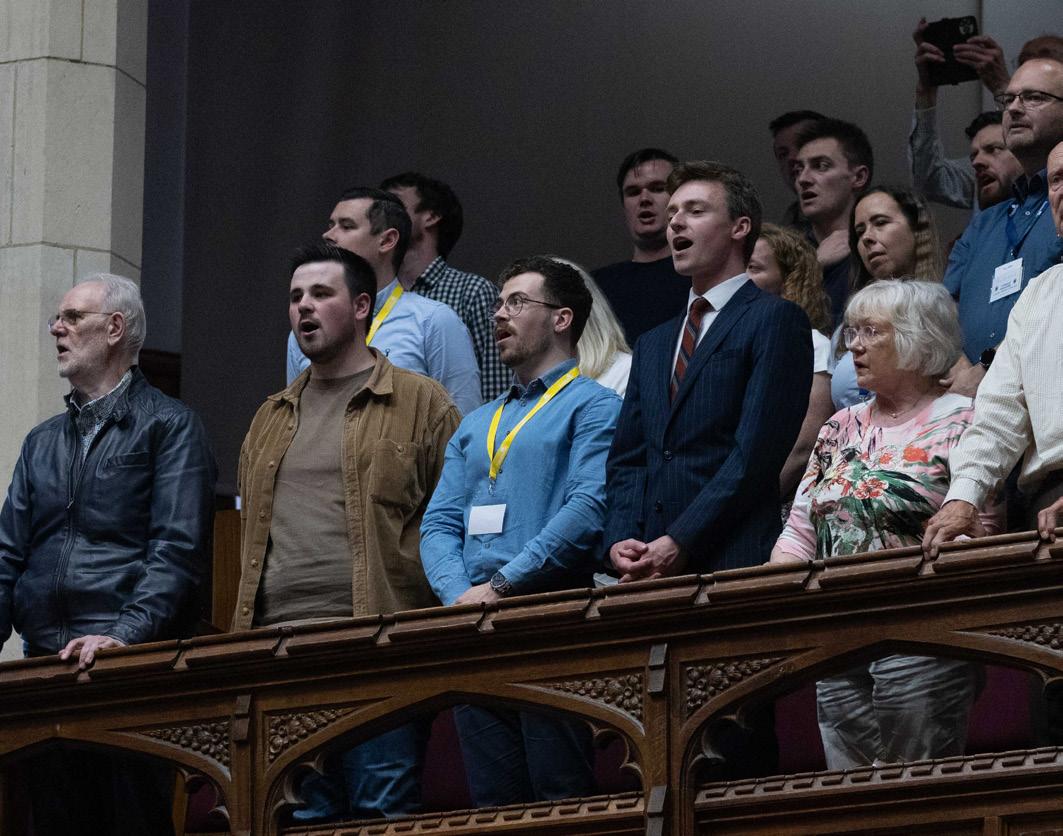
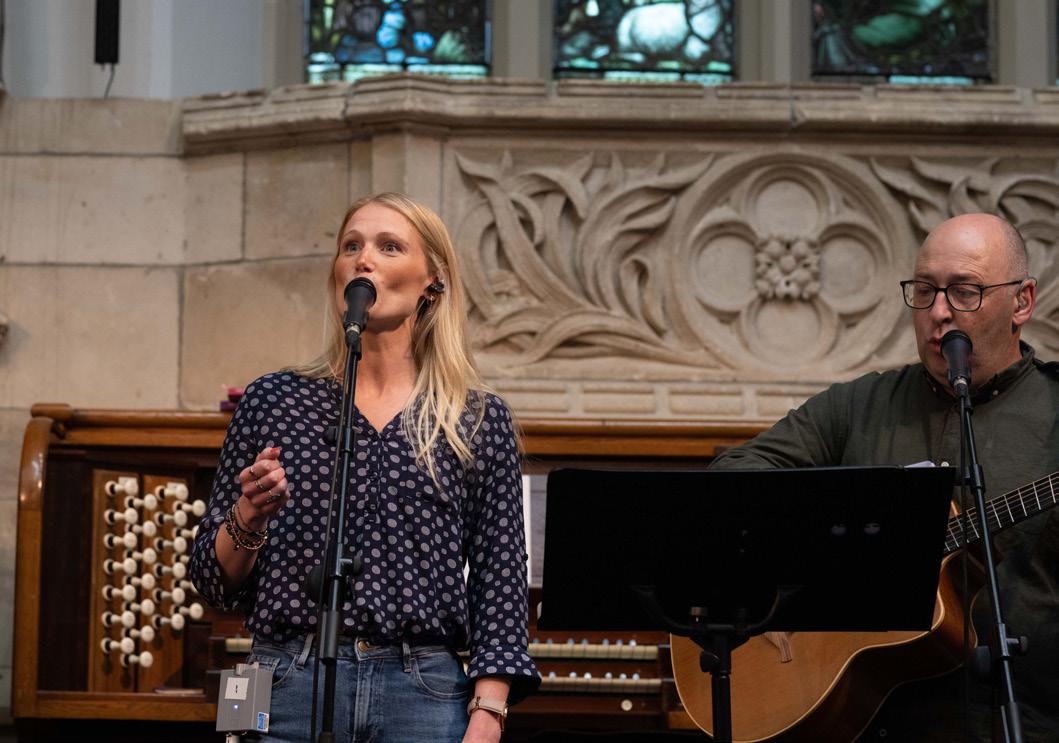
Ministers step away from their congregations during their time as Moderator, which enables them to concentrate on their new and important role. Dr Gribben has also stepped away as Clerk of the General Assembly, his ‘day job’, as he describes it, which left a new look to the platform party during the Assembly.
Rev Dr David Allen, PCI’s former Deputy Clerk, was appointed Acting Clerk of the General Assembly and Acting General Secretary by the General Council, effective from 12 May 2025 to 31 August 2026, when Dr Gribben returns as Clerk. The General Council also appointed Rev Peter Gamble, recently the minister of The Mall Presbyterian Church in Armagh, as Deputy Clerk and Deputy General Secretary. Peter took up his new permanent role on 19 May. Dr Allen’s predecessor as Deputy Clerk, Rev Jim Stothers, acted as Minute Secretary to the Assembly.
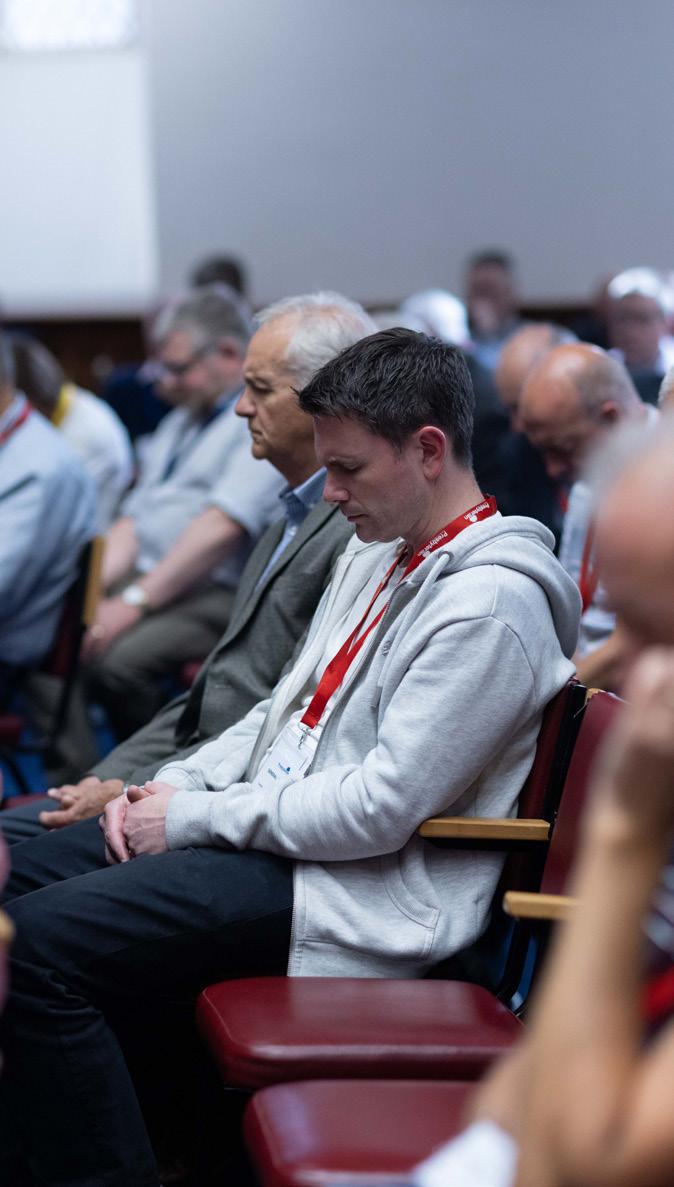
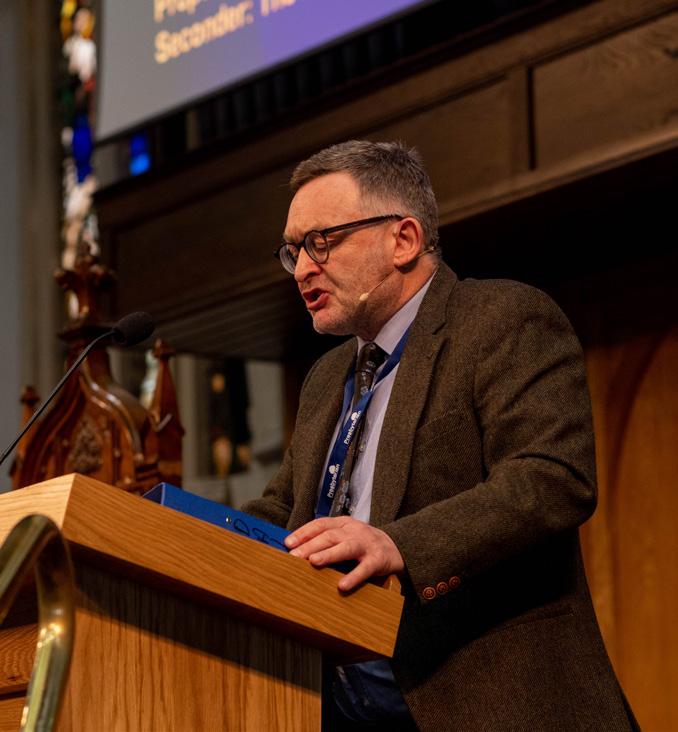
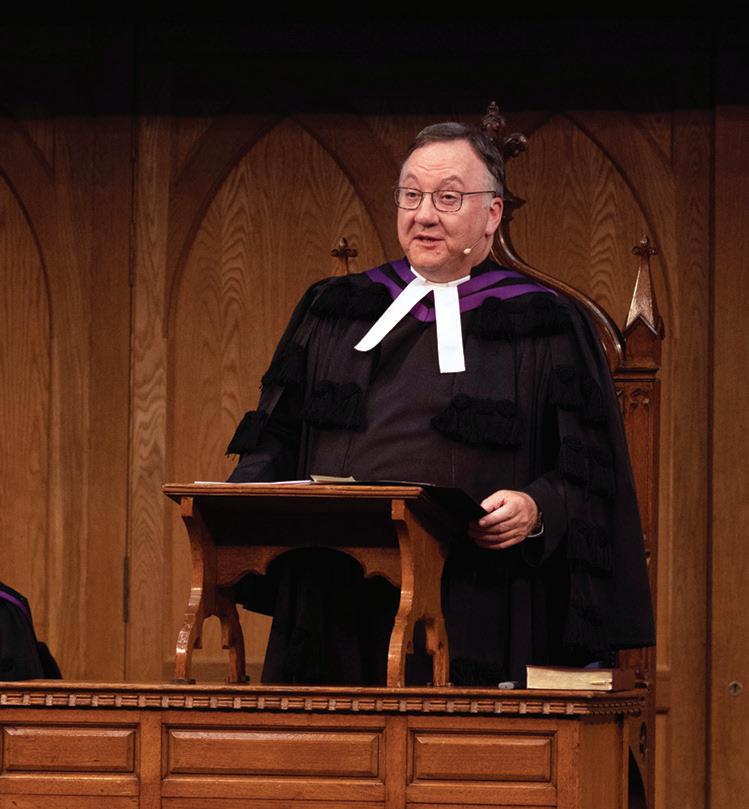
“I’m the Moderator”
Having attended the General Assembly for nearly 40 years, and having been the Deputy Clerk and Clerk of Assembly for 17 years, in his opening remarks Dr Gribben had what can only be described as a split-second momentary lapse – that brought laughter and applause from across the House.
Having welcomed his personal guests, through force of habit he paused and continued his remarks in the way that he had done in years past, and as all speakers do when addressing the Assembly: “Moderator…” he said, followed in a flash by, “…I’m the Moderator.” A realisation dawned, and a penny dropped? No, probably just a moment in time.
The General Assembly paused twice to specifically come to God in prayer about the pressing issues of our times.
On Tuesday evening following the report of the Council for Public Affairs the House paused to pray about the issue of the parliamentary proposals to legalise assisted suicide. Led by the outgoing Moderator, the House prayed in small groups about the need for greater compassion in society towards those who are dying, for greater clarity into what the current proposal before Parliament will mean, and for courage for those, both in Parliament and the medical professions, to speak up against what is being suggested.
Again, on Thursday morning the new Moderator, called on the House to pause and pray about the situation in our world, particularly in places where war and violence are current; Sudan, South Sudan, Gaza, Palestine and Israel, Ukraine and even on our own streets, where violence had returned.
Building on his theme of ‘Hope and a Future in Jesus’, Dr Gribben, called on the House to pray to the King of Peace, for the peace of the nations, remembering particularly those of our global partners who are working in war-torn places.
There is a ‘language’ that those new to the General Assembly may not understand or recognise.
For example: the ‘Blue Book’ – is the book (whose covers are always blue) containing the reports, resolutions and issues to be discussed at the General Assembly. “The House” – broadly means the members of the General Assembly or the room in which the General Assembly meets. “Conveners” – those who convene/bring together the various councils, committees and associated bodies of PCI. “Memorials” – a formal request by a presbytery, congregation, session or group of individuals for the General Assembly to do something.
The report of the General Council section 3 contained the Report on the Communications Strategy and details of the new PCI website.
In presenting the report, the Very Rev Dr David Bruce informed the General Assembly that the strategy contained some very important steps in the formation of agreed policies on the likes of social media, press and media, and a communications crisis management plan.
In addition, the review recommended the formation of a Communications Panel, under the General Council, being populated by those with an expertise in communications.
Alongside the Communications Strategy, a report on the PCI Website Task Group was also received. Dr Bruce was pleased to report that the rebuild of the PCI website is almost complete and should be finished in the mid to late summer. The report detailed that a local firm, EyeKiller, had been appointed to deliver the design and development of the new website.
The report went on to thank the members of the task group involved in this project. All being well, the much-needed new website will soon be operational for the benefit of all both inside and outside the church. The full report can be read in the Blue Book pages 93 -98.
In terms of voting, there are three types – an oral vote – where members are asked to signify agreement by saying “aye” or disagreeing by saying “no”. Next is a standing vote, when voting members are asked to stand holding their voting cards either in favour or against a resolution, while a count is taken. Finally, there is the card vote, when voting members cast their voting card in a ballot box for counting.
And then there are the lanyards! Dark blue lanyards are worn by ministers, red lanyards by elders (both ministers and elders are voting members). Yellow lanyards are worn by Under-30 representatives, other non-voting representatives and those attending with speaking rights but not voting rights, for example overseas representatives.
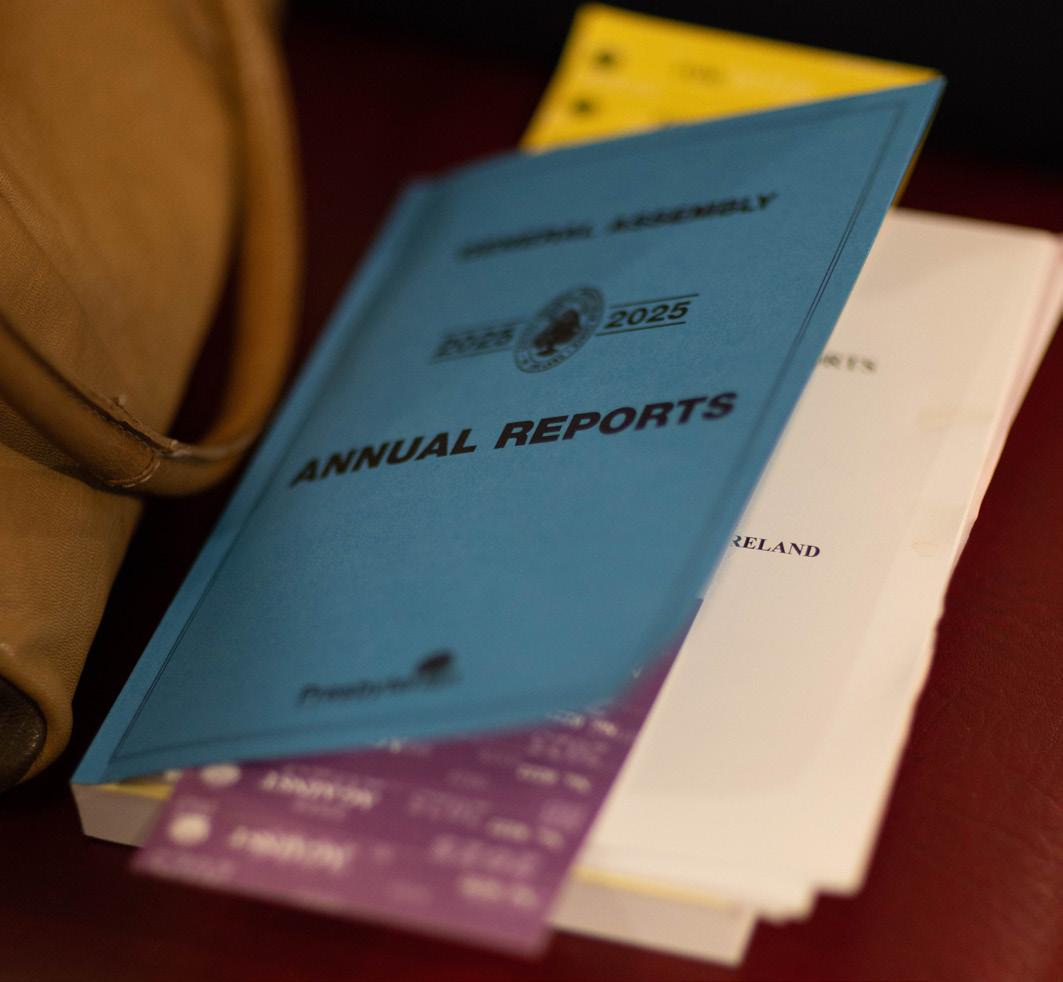
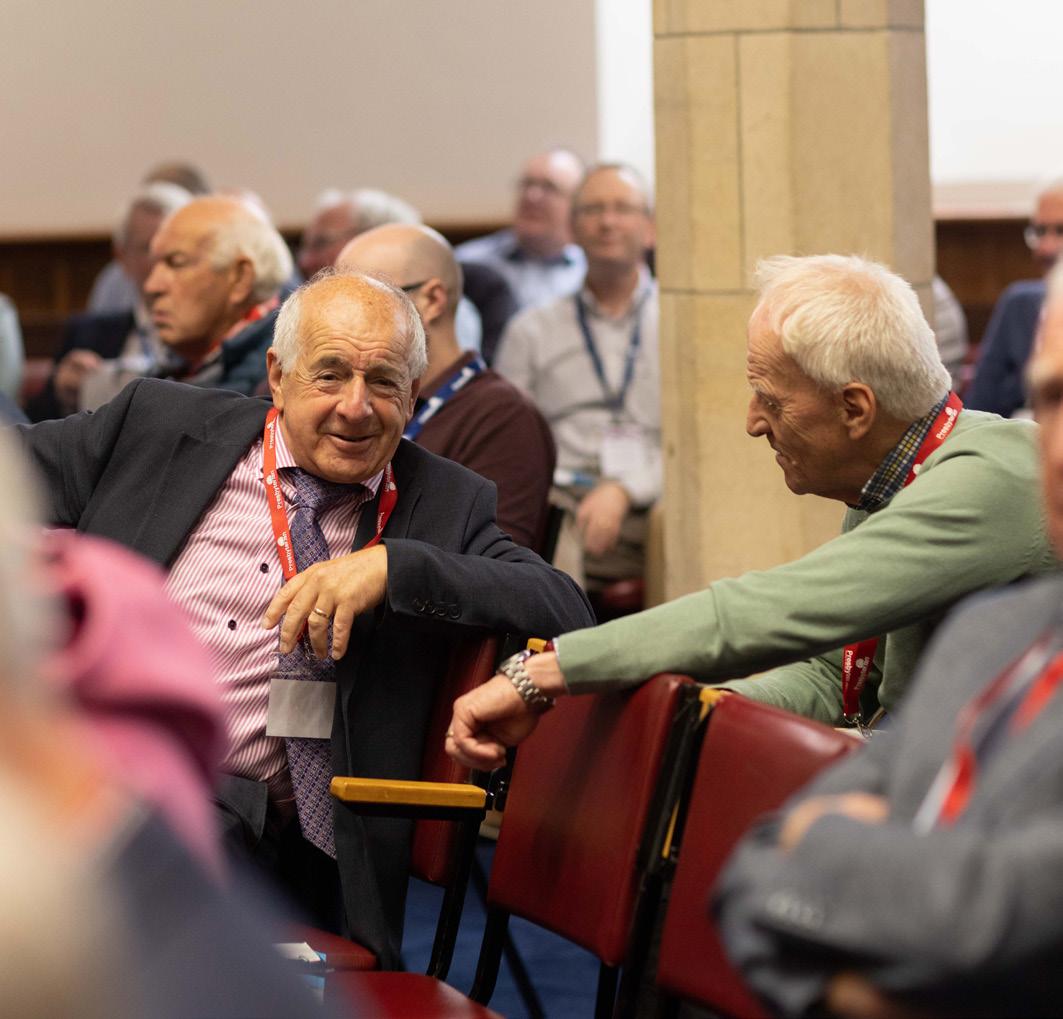
Seconding the report of General Council’s United Appeal Committee, (pages 3135 of the Blue Book), convener of the committee, Martin Hampton, reflected on the fact that this year’s United Appeal report was more positive than last year’s.
He reported that when donations for the 2024 Appeal had been collated and counted, more congregations had contributed, and overall, the United Appeal surpassed its 2024 target by approximately £200k, bringing the 2024 total to £3.6m.
Mr Hampton thanked the congregations for their engagement with United Appeal in a continuing time of financial pressure for many congregations and individual members.
The target for 2025 is £3.3m, with a slight increase for 2026 to £3.4m.
Concluding his remarks, Mr Hampton spoke of the exciting plans that the various councils had which would be brought before the General Assembly. He told the Assembly he spoke with confidence and conviction, because he believed deeply in the shared calling to advance the gospel, both at home and across the world, through United Appeal. To learn more about the United Appeal, click here.

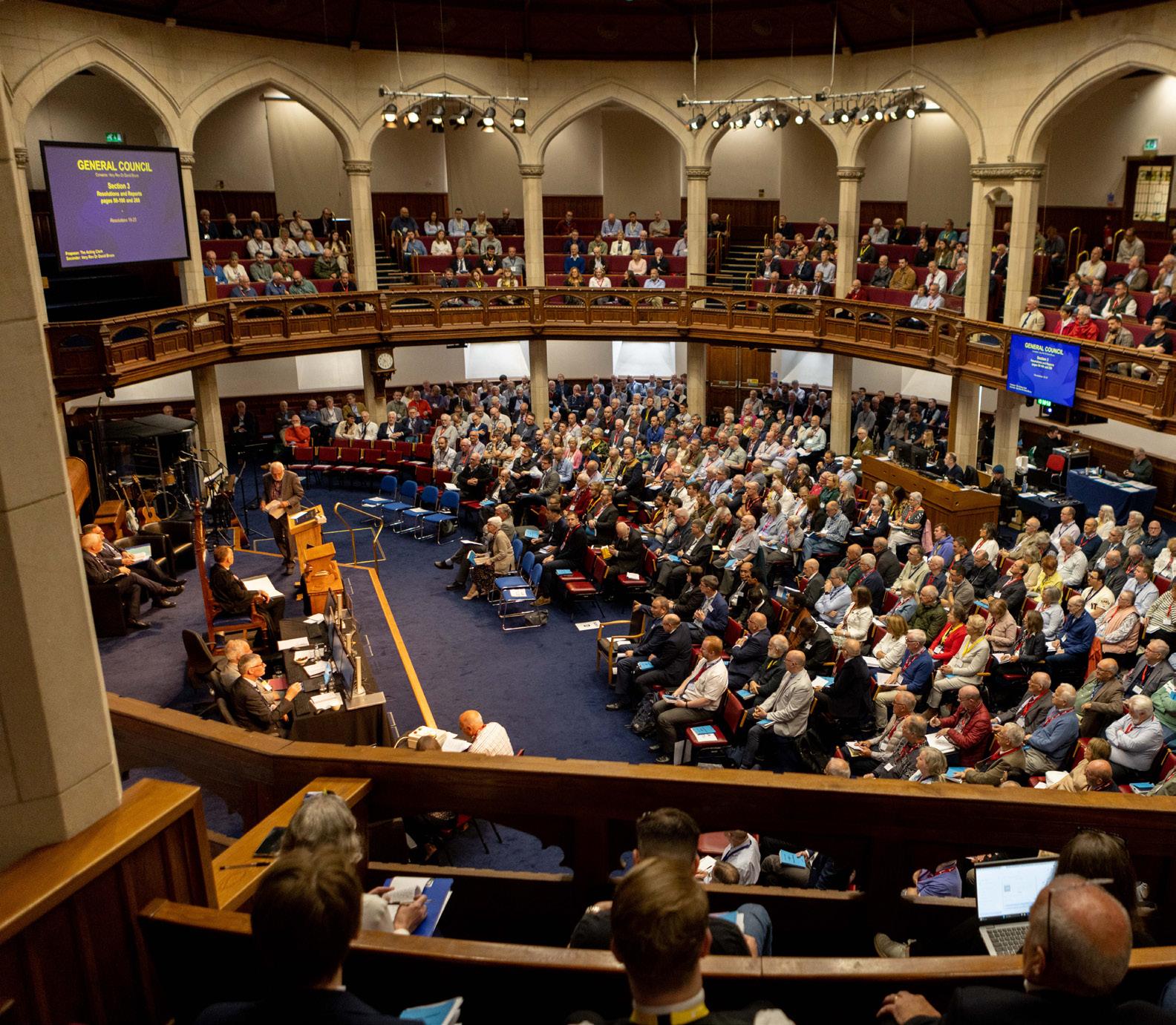
The Council for Congregational Life and Witness (CLW) was one of the councils that did not present their report verbally this year.
Following the launch of the Present initiative at the 2024 General Assembly, this year CLW shared that as the initiative enters year two, the focus will fall upon providing simple ways in which congregations can develop the Present theme in forms they consider most useful to them.
Following discussion amongst Council members, committees and panels, feedback suggested that emphasis should be placed on sharing stories of how congregations are finding ways to express being present to God, one another, and where God has placed them to be witnesses.
The key to understanding Present, as the report highlighted, is that it aims to:
• encourage congregations to celebrate that God is at work in the ordinary,
• be creative in how they approach the spiritual rhythms of their lives,
• feel a greater connectedness as a denomination,
• be simple to engage with, yet also significant enough to make a difference.
Further information can be found here.
A key question that the Council for Social Witness (CSW) asks itself is, ‘Do we reflect properly the love of God in our services, or has the Council conformed to the secular culture of services based on the state’s standards?’
CSW is a service provider for approximately 400 people, it operates under a highly regulated sector within a particular budget, and yet, uniquely, it seeks to remain ‘warm’ so that the people in its care begin to know the reality of mattering to God through the care they receive.
Acknowledging this challenge, CSW reported to the Assembly their business objectives for 2025-26, including the need for better stewardship. So, while some budget problems remain, the good news is that substantial improvement has been achieved in the Council’s finances. Furthermore, going forward, CSW’s services should generate resources to enable work with key marginalised groups.
You can read the Council’s report and associated resolutions on pages 121-152 and 289-290 of the Blue Book by clicking the link here
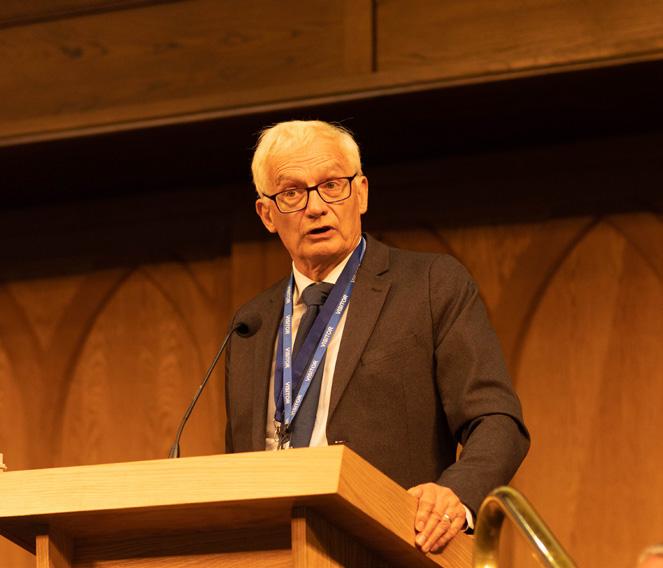
On Tuesday evening the Council for Public Affairs convener, Rev Daniel Kane, reminded the Assembly that, “Banning Conversion Therapy practices continues to be an area of concern, which we keep under constant watch.”
Having met with Eoin Tennyson MLA regarding his Private Member’s Bill, they were able to express to him their grave concerns regarding his proposals, especially the use of the term ‘Conversion Therapy’ – an ill-defined, umbrella term covering all kinds of abusive practices, many of which are
already outlawed.
It was highlighted to Mr Tennyson that “any future legislation should not criminalise ministers, church workers and parents as they walk alongside those who struggle with their sexuality pastorally and prayerfully.”
The General Assembly were unanimous in supporting the resolution expressing grave concern regarding the proposed Private Members’ Bill.
You can read the Council’s report and resolutions on pages 156-175 and 290-291 of the Blue Book
On the opening day of the General Assembly, members approved a strong set of denominational policies relating to the safeguarding of children and adults in Northern Ireland and the Republic of Ireland, describing this critical work and understanding of the issues as being ‘at the heart of good faith-based safeguarding.’
The convener of the Council for Social Witness, Rev David Brice, began his report by reminding the Assembly of the essentiality of safeguarding. In a world which is broken, where dangerous individuals seek to groom children, the vulnerable and even the organisation, a robust safeguarding policy is paramount.
Using the phrase ‘Training, Tracking and Telephone’, Rev Brice encouraged the Assembly that there is no need to despair. By ensuring a sustained engagement with safeguarding training, keeping on track with policies and procedures, and having the assurance that advice and support is only a phone call away (i.e., the Safeguarding Office) congregations can avoid these potential dangers.
Mr Dermot Parsons, CSW Secretary, went on to highlight in his speech how “safeguarding should be a gentle underpinning for the church’s work with children and adults… Real safeguarding does not get in the way of mission and ministries – it enhances it.”
For further information about the revised Safeguarding policies, click here and scroll to pages 121152 for the report and 289-290 for the resolutions.
Assisted Suicide featured heavily in the report of the convener of the Council for Public Affairs, Rev Daniel Kane. Reminding the Assembly of the detailed report from the Assisted Suicide and Euthanasia Task Group, Mr Kane stated that, “this significant report reaffirms our belief in the intrinsic value and innate dignity of every human life from conception to death as a precious gift from God.”
He also commended to the House the ‘Living and Dying Well’ hub on the PCI website – a repository of useful information regarding this subject.
Crucially, Mr Kane reminded members of the need for urgent prayer regarding two items of legislation aimed at legalising assisted suicide – one going through Westminster and the other through the Scottish Parliament.
In relation to Northern Ireland however, we heard how the real scandal is the lack of appropriate care and support for people considered terminally ill and their families. It was shocking to realise that a large proportion of palliative care in Northern Ireland is funded through charitable donations and fund-raising activities.
The Council continues to call on both the UK and Irish governments to prioritise the provision of the best palliative care with immediate effect.
Mr Kane concluded by encouraging congregations to uphold all those who provide palliative care services through an annual focus at a Sunday service, because “good palliative care is the only real alternative.”
To read the Council’s resolutions in full turn to pages 290-291 of the Blue Book.
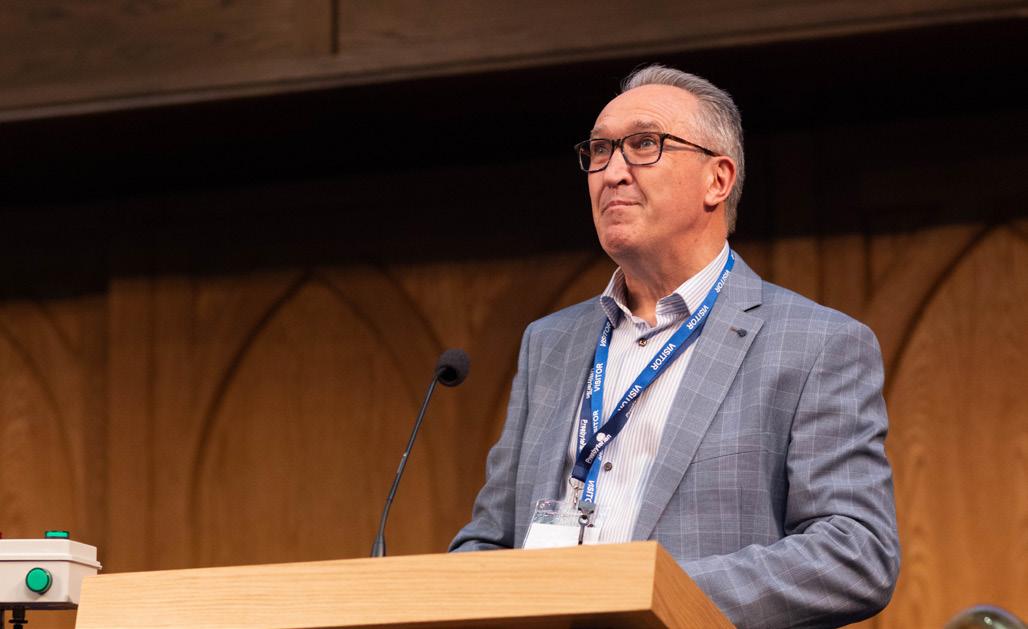
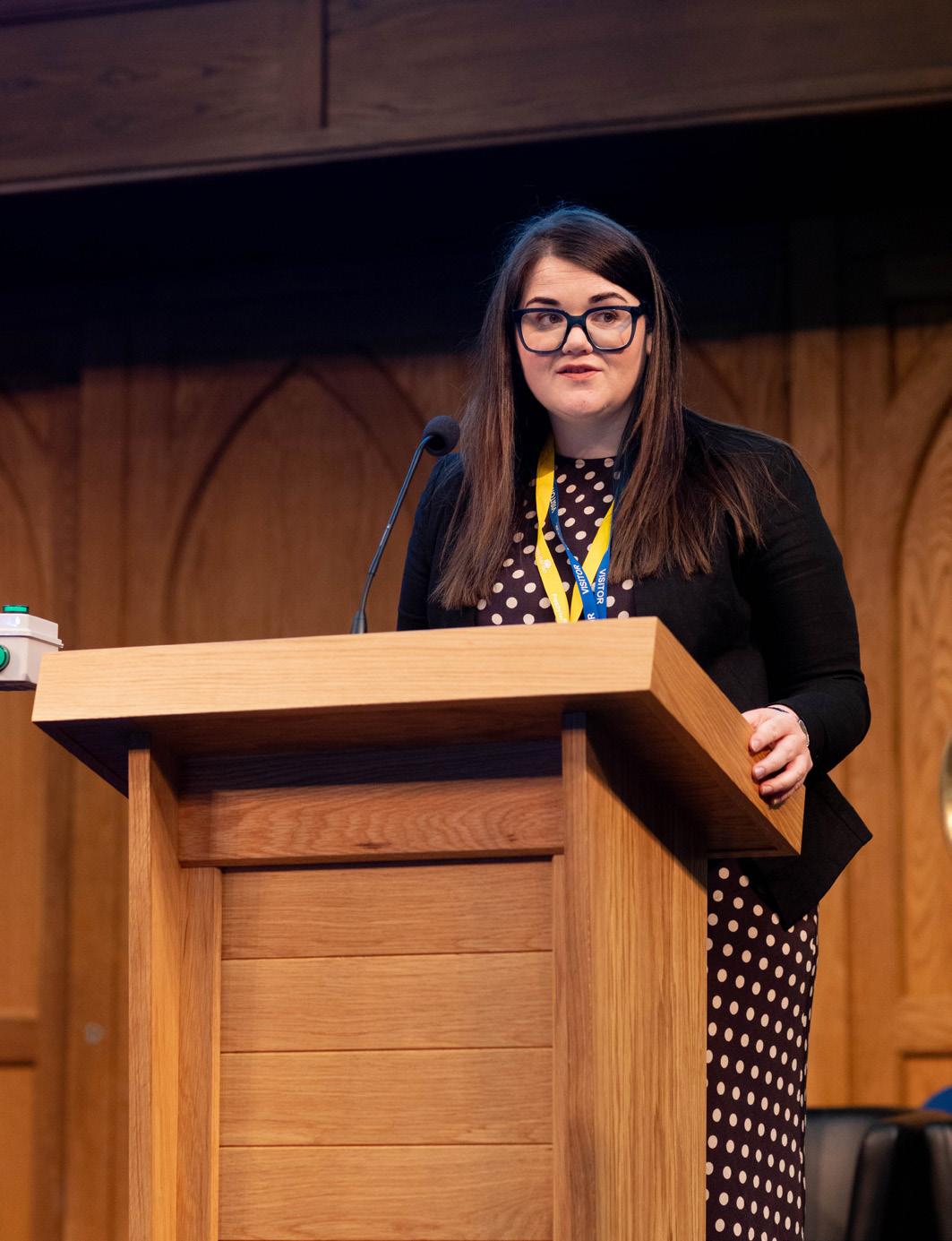
Education, and in particular Special Needs Education provision, was a key feature in the report of PCI’s Public Affairs Officer, Dr Bex Stevenson. In an area where many Presbyterians are involved at a variety of levels and spheres, she told the Assembly how it is now also “an area of society where it is becoming increasingly challenging to be salt and light, as there are many … who contest the role of the church … in education is out-dated… and even damaging.”
However, there were also words of encouragement by Dr Stevenson when she described the examples of “servant-hearted leadership, co-operation and collaboration” she witnessed on visits to schools with the Moderator during the year. All of which contributed hugely to the development, thriving and flourishing of school pupils.
The Assembly was informed of the crisis in Northern Ireland of Special Educational Needs provision, with more than 11,000 children requiring places. With that in mind, in a number of resolutions, the General Assembly commended ‘the long-awaited publication of the Special Educational Needs Reform Agenda in Northern Ireland, affirmed the vital work carried out in SEN schools across this island, and encouraged congregations to make meaningful links with such schools.’
In a Memorial to the General Assembly from First Bangor, the kirk session sought permission to change the name of their church. Rev Mairisine Stanfield, minister of First Bangor, described how it had been a seven-year process to reach this point, which started when they began to reflect on the 400th anniversary of Presbyterianism in Bangor.
This led them to believe that this was an opportunity for fresh connection and engagement with the community, saying, “We are living in a time and culture where there is a loss of respect, trust and credibility towards and about the church.”
Quoting the 2021 Northern Ireland Census, which revealed that 1 in 3 within the Ards and North Down area have no connection with faith, this led the congregation to understand their need to significantly update their online presence – one which would better represent their vision, values and life together as a congregation. A critical part of the refresh was not just a new website and a new logo, but a new name, which would cause people to give them a fresh look.
So, after much consideration, the name ‘City Church, Bangor’ was born, with the strapline: ‘A fresh expression of First Presbyterian Church Bangor’ – declaring their identity as a Presbyterian Church.
The Moderator put the Resolution to the House and the name change was approved.
You can read the Memorial on page 178 of the Blue Book
It was with anticipation and interest that Rev Jim McCaughan, convener of the Guysmere Panel, introduced the promotional video illustrating the potential redevelopment of the Guysmere site in Castlerock.
In 2020 the Guysmere Trust was formed and following extensive research and detailed work, they have developed a model of three income generating elements to sit alongside the youth focus core of the project.

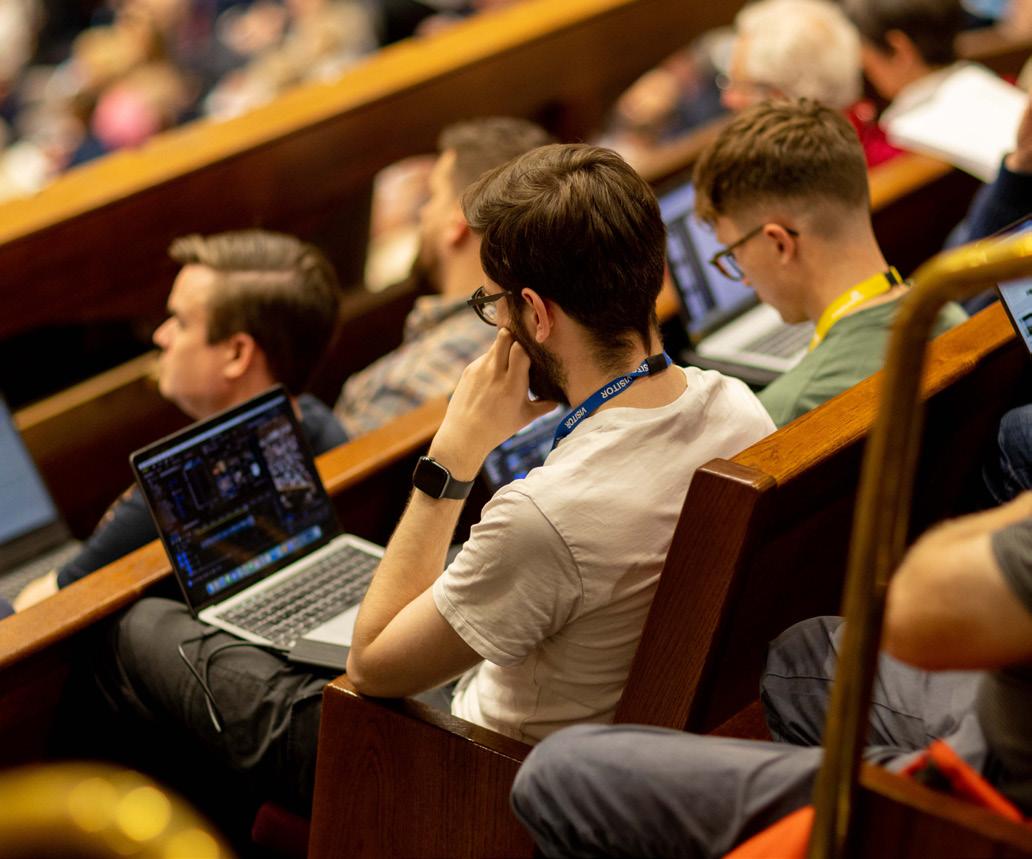
While mission, ministry and discipleship remain at the heart of the vision for the future of Guysmere, the Trust has refined a development proposal to sit alongside this:
• Exploring Ulster’s Christian Heritage
• Learning from C.S. Lewis: his Roots and Legacy
• Discovering the Ulster-Scots – their History, Faith and Culture
Having raised half of the £300,000 needed to engage architects, with a sustainable business plan in place, Rev James Hyndman, minister of First Coleraine, urged PCI to give their support. “To share the vision of Guysmere, pray with us that God will open the right doors at the right time – to support the mission of PCI”.
Visit the Guysmere Trust website here. Guysmere Trust
PCI’s Home and Urban Mission exists to allow for greater levels of flexibility and support within the general structures of the Church in areas that are considered as missional priorities. The Council for Mission in Ireland (CMI) is responsible for it.
At the time the General Assembly met, there were 60 Home and Urban Mission congregations. Come the end of June, there was one less – as Kilkenny left the scheme. On Wednesday evening, during discussion on the CMI report, the General Assembly noted their ‘exit’ after an elder, William Harper, told Kilkenny’s story.
Formed in 1838, by the early
1980s Kilkenny’s membership had dwindled to 20 people, when he and others encouraged ‘Church House’ to send them a minister. In 1984, Rev John Woodside began his 38-year ministry, with Billy Patterson as a Mission Worker. “Even though our congregation was small, they were deeply committed to Christ and the gospel…over the next seven years… the Lord added to the church those who were saved,” Mr Harper said. Their one-room building became too small and a new purpose-built meeting house was opened in 1992 – today, the church is still growing and no longer requires the support of the scheme. Concluding his remarks Mr Harper said, “Because of your support there are many people in Kilkenny rejoicing in the God of their salvation, who otherwise would never have heard the gospel…”
On Wednesday evening, the Rev Craig Lynn paid tribute to all those who work as part of our chaplaincy teams. Mr Lynn said chaplaincy was definitely different from congregational work, and is about meeting those that needed Christ in hospitals, staff rooms, prisons, army bases, lecture theatres and cattle marts. It is a ministry of ‘presence with people’ often at the most challenging periods of their lives. Rev Rob Bell, retiring co-convener of the Chaplaincy Panel, reminded the Assembly, that while many thought that chaplaincy was ministry at the edge of the Church, it was actually ministry at the heart of real life.
The Assembly was urged to pray for the work of chaplains, to encourage and support them, and for others to consider the call of God in relation to this vital work.
Other speakers reminded the Assembly of the roles of chaplains to sports teams and other groups; sharing the gospel in situations as the Moderator described, “not necessarily officially under the control of the General Assembly but under the Kingdom of God”.
The Report on Chaplaincy, ‘A Ministry of Presence’ was warmly endorsed by the General Assembly. The full report can be found on pages 262 – 269 of the Blue Book.
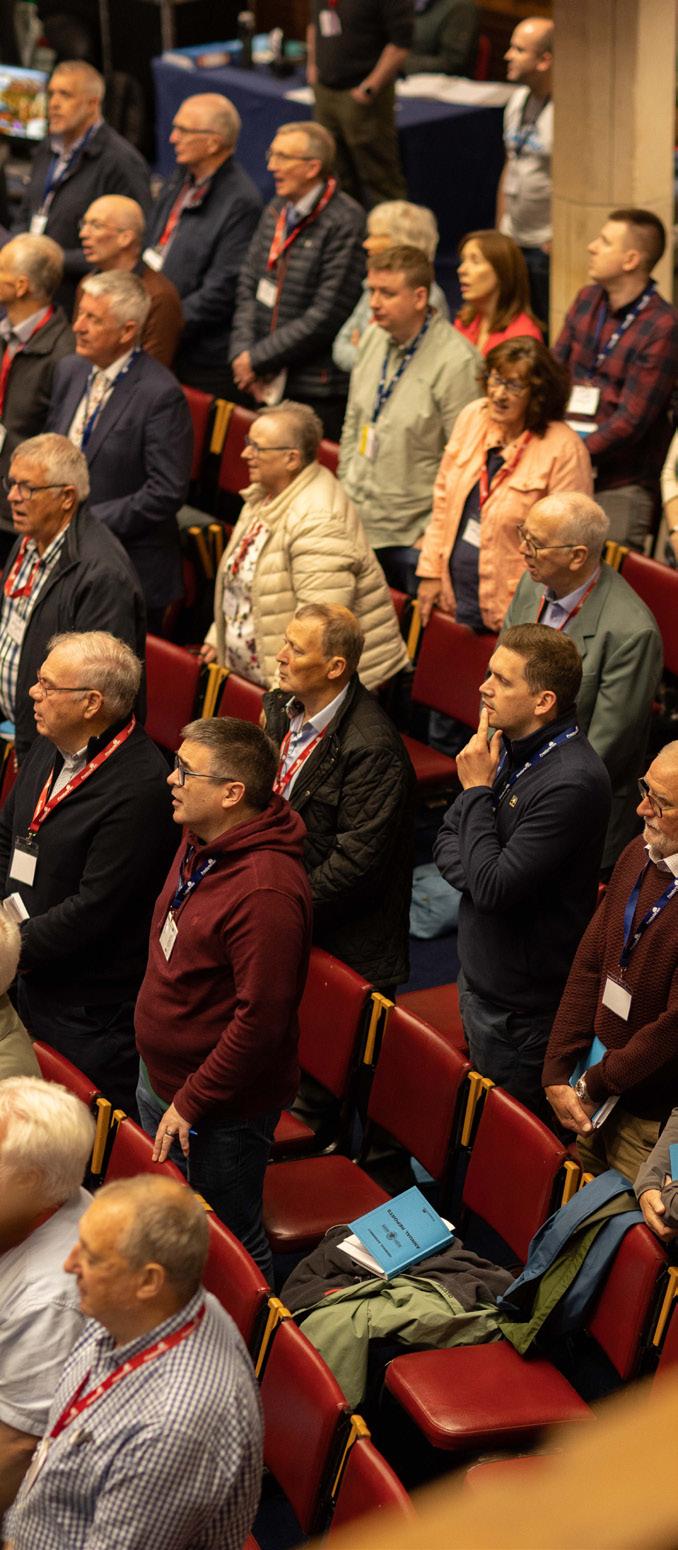
In many organisations, mergers and acquisitions are the normal rhythms of adaptation and change, and this year at the General Assembly there was a similar feel. With the ongoing reconfiguration of ministry, a number of churches were merged, while other areas of work were recognised for their growth and expansion.
However, not all mergers were due to congregations decreasing. The congregations of Townhill and First Portglenone, were merging, some might say reuniting after a split in the 19th century. In addressing the Assembly, Rev Albert Baxter spoke of a thriving congregation of over 350 at worship, with many young people seeking to live out their faith as God called them.
For him, the vision of reconfiguration was seeing thriving presbyteries, requiring fewer ministers, but growing in ways that would see many new ministers coming out of training and being able to go into areas of Ireland where PCI has not been for hundreds of years. In closing Mr Baxter reminded the House, “as we see God move in mighty ways – may he be glorified for all of that”.
Details of the mergers and one dissolution can be found on pages 292 and 293 of the Blue Book.
Wednesday afternoon saw one of the highlights of the General Assembly, the popular session, ‘Listening to the Global Church’.
With delegates from Malawi and Indonesia taking part, this year’s theme was taken from 1 Corinthians 12:12: ‘One Body, Many Voices’. Representing the Church of Central Africa Presbyterian, Livingstonia Synod, was its General Secretary, Rev William Tembo. He spoke of the Church’s 150th anniversary and how half of their current membership is under 25. PCI’s Moderator, Dr Gribben, will be a guest at the celebrations. Prayer that Malawi’s September elections be peaceful was also requested.
The Assembly moved from Malawi to Syria and Ukraine, when two women, via pre-recorded videos, reflected on April’s conference ‘The unheard voice: Women’s Persevering Witness in War’. Held in Beirut, Heather McClements, of PCI’s Global Mission Committee had attended and introduced the segment.
Members also heard from delegates from Gereja Masehi Injili di Halmahera in Indonesia, where over 100 trainee ministers would be eventually ministering in a region of over 1,000 islands. To conclude the session, Rev Colin Dickson from PCI’s International Meeting Point (IMP) interviewed a young man from Nigeria, about his experiences settling in Belfast and the support that IMP had been to him.
After a minute of prayerful reflection, the Moderator closed in prayer.
In presenting the report, the convener, Rev Andrew Faulkner, welcomed the acceptance of 12 candidates for training and also welcomed the addition of a number of ministers from other denominations joining PCI.
Whilst welcoming the strong numbers, Mr Faulkner reminded the Assembly that more men and women with the gifts and talents for ministry are needed to come forward for training. He reminded those in leadership, that we should be seeking out those with the

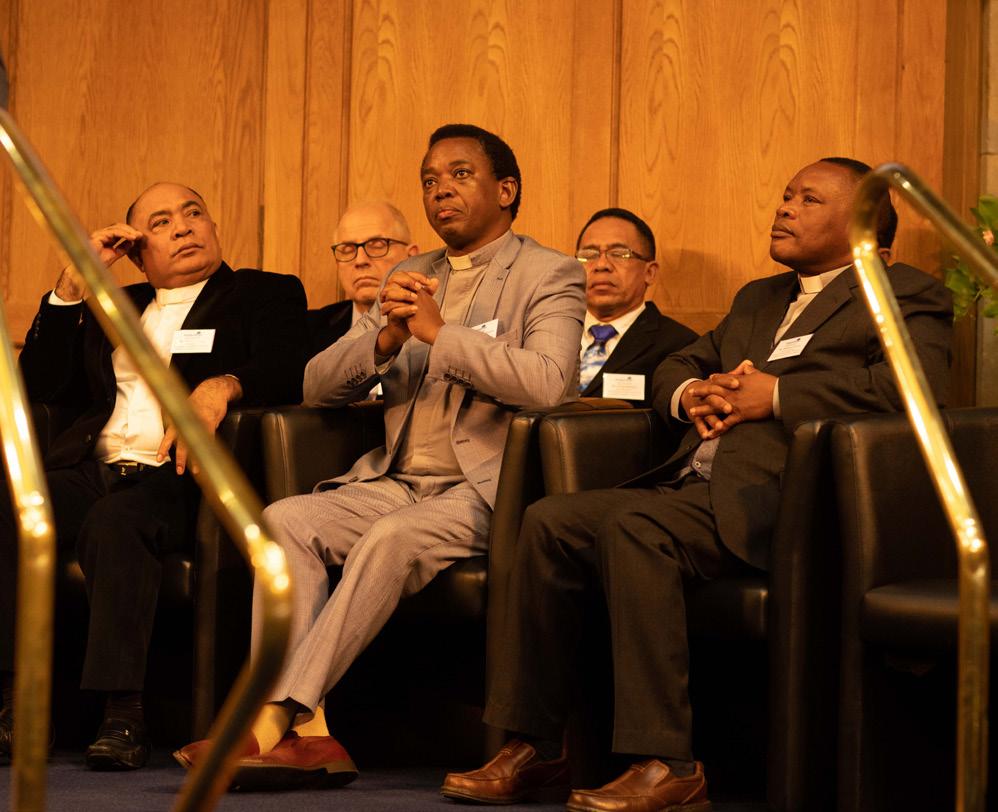
gifts required, and encouraging them to put themselves forward.
In response to a contribution from the floor of the House, the convener confirmed that the Council had already begun work to look at the financial support the church is giving, and could potentially give to students going through Union Theological College, PCI’s theological college.
In seconding the report, Principle of Union, Rev Prof Michael McClenahan, welcomed the first graduates of Union’s BA Hons in Theology and thanked Rev David Leach for his years of service to Union. He also paid tribute to the work and contribution of Prof Gordon Campbell and Dr Desi Alexander who both retired.
Further details can be found in the Blue Book pages 275 - 284
A bold vision for new church development was considered by the General Assembly on Wednesday evening, the first session chaired by new Moderator, Dr Trevor Gribben.
Following the debate on the Council for Mission in Ireland’s (CMI), report, the Church committed itself to establishing at least 10 newly constituted congregations and launching 10 more church planting projects in the next 10 years.
Presenting the Report CMI convener, Rev Ben Walker, highlighted how revolutionary the gospel of Jesus Christ really is, and how the Council are seeking to enable and encourage the creation of Christ-centred, worshipping communities throughout Ireland.
Referencing Acts 17, he noted that, “from West Belfast to Wexford, Carrigart to Cork, Galway to Greystones, this revolutionary message is being shared…God is gathering his revolutionary people in places across this island…we’re
For the first time in 15 years a new church, ‘Central Belfast’ will become PCI’s newest congregation after the General Assembly approved the move, following eight years of prayerful and dedicated work on the ground.
The decision was taken on Wednesday morning, when the Assembly agreed to Carnmoney Presbyterian Church’s Memorial to authorise the establishment of ‘Central Belfast’ as a congregation of the Presbyterian Church’, joining the 500-plus other congregations in the denomination.
Talking about the good news, David Dickinson, who leads Central, and is training for PCI’s ordained ministry, said that starting with nine people eight years ago, and following a number of moves and a pandemic - today “is an exciting day and important moment in Central’s journey… As I look at all God has done these past eight years, and as we open the doors every Sunday to see hundreds of people gather…I’m hopeful and expectant for all God is yet to do.”
delighting to see… that God’s Spirit is at work, through his people and his Word, proclaiming Christ.”

Building on this theme, Council Secretary Rick Hill, highlighted the growth and development of projects and congregations in Balbriggan, Belfast, Wexford, Carrigart, and Kilkenny. Speaking about the Council’s major report ‘Church Planting –The Next Decade’, or ‘10+10 in 10’ he said PCI is a church-planting denomination, pointing out that recent fruitfulness in Maynooth, and Donabate, have been examples of this.
He commended CMI’s vision to see 10 newly constituted congregations, plus 10 new church planting projects, in the next 10 years saying, “We are praying for this vision to impact towns and cities, stretching southerly and westerly to renew our witness across Ireland.”
You can read the report on pages 229-269 and resolutions on page 294 of the Blue Book.
Established in Belfast’s Cathedral Quarter in October 2016, by Carnmoney Presbyterian, it initially met in the MAC theatre. Moving to the ground floor of Assembly Buildings in April 2018, a permanent home, was found in the old May Street Presbyterian Church in 2019. “Today, Central now exists as a worshipping community of between 350-375 people, which is an amazing work of God,” David said.
You can read more about Central here and Carnmoney’s Memorial on page 176 here.
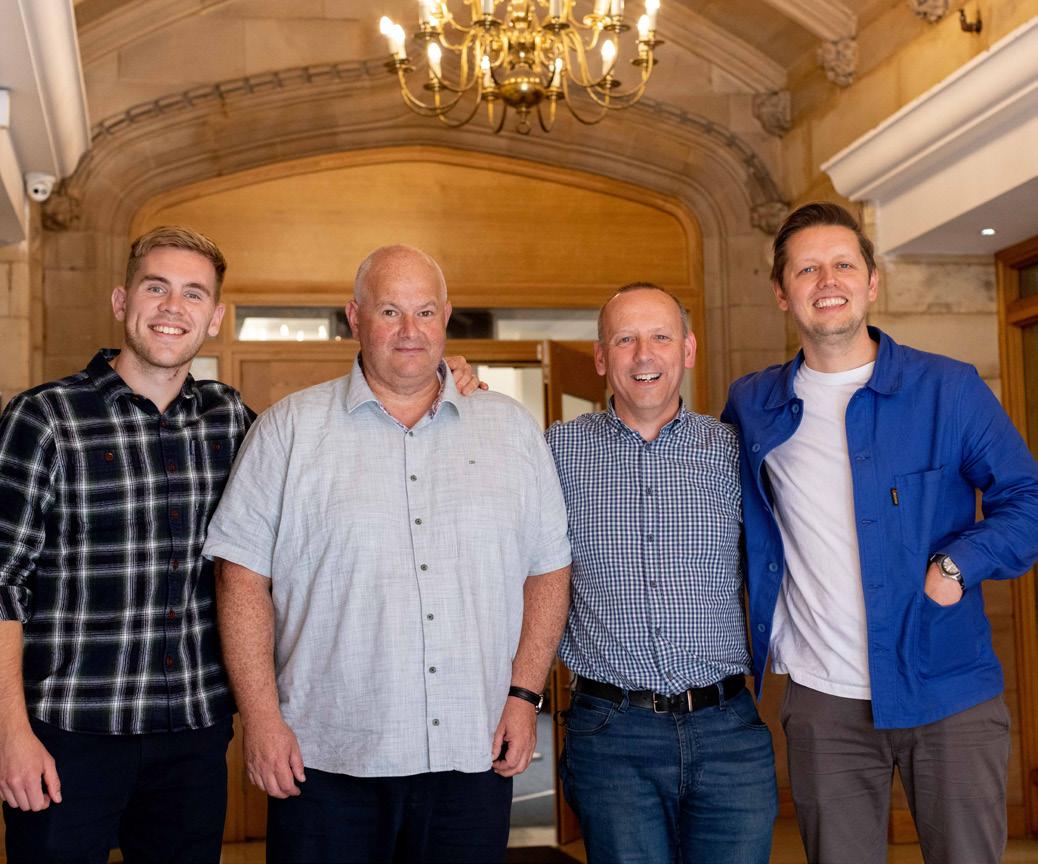
On Wednesday morning Down Presbytery, one of PCI’s 19 regional bodies, brought a Memorial before the General Assembly to ‘recognise the office of the deacon to be a permanent one in the church’ and ‘to reconsider allowing the ordination of deacons in order to free up ruling elders from diaconal work.’
Rev John Torrens, minister of Second Saintfield and Moderator of Down Presbytery, presented the Memorial to request that a task group be set up to consider how deacons might be ordained, “in a desire to see our Church avail of all the benefits that Christ offers his people through faithful and biblical church government, which includes the office of deacon.”
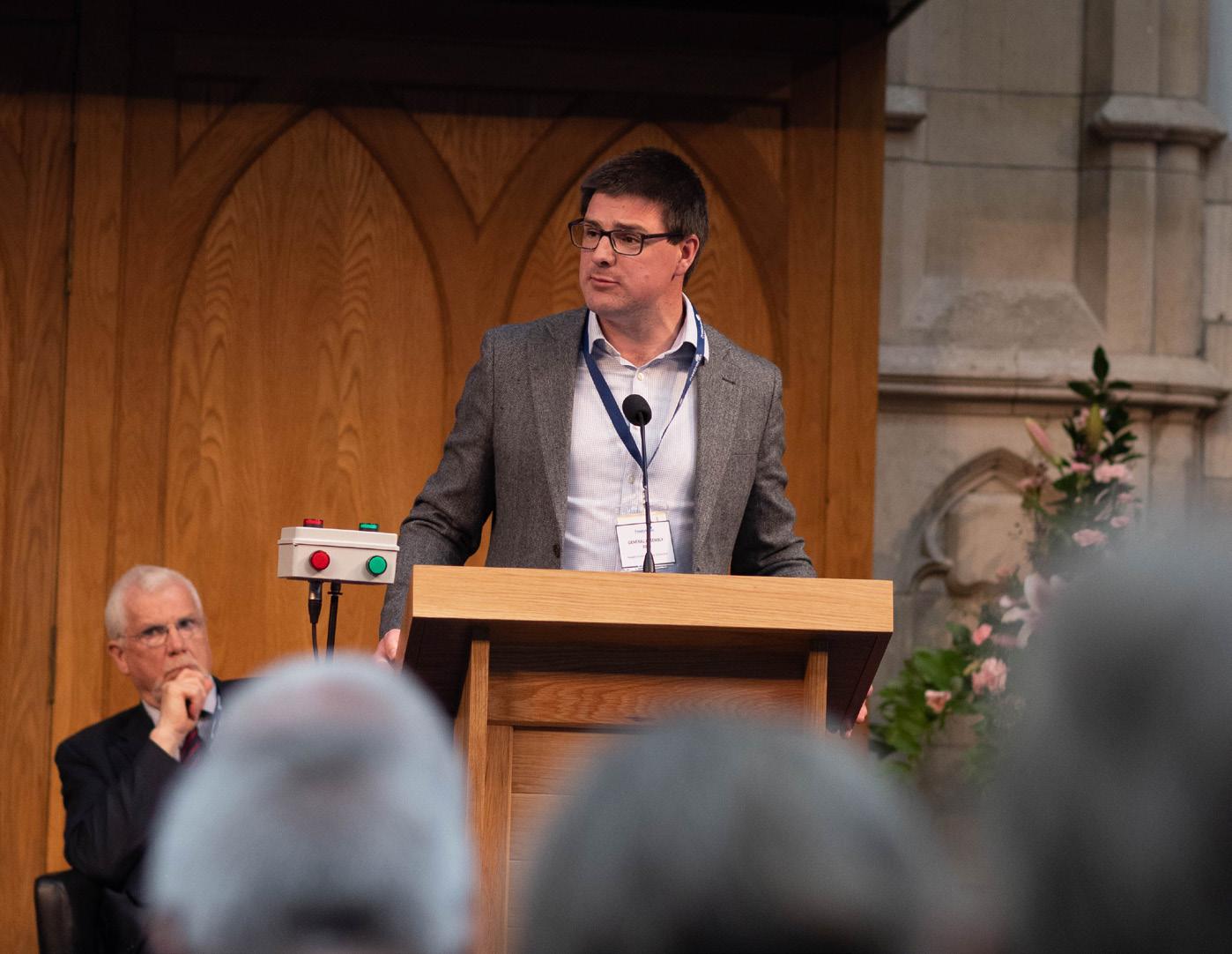
Mr Torrens quoted Scripture where the office of deacon is clearly seen, for example, Acts 6:7, Philippians 1:1. He also highlighted that PCI’s constitution recognises the office of deacon as a permanent office of Christ’s Church (Para 15 The Code). He reminded the Assembly that Scripture tells us of the benefits of roles, whereby deacons are engaged in ministries of mercy, making it their business to care for those in physical need.
The expansion to the work of the congregational committee was stressed – committee has taken on the role of deacon and much more, from administration to the upkeep of buildings. The result; it has become increasingly difficult for them to do the work of a deacon, for instance, to seek out those in need and care for them.
Rev Jonathan Boyd, minister of Killyleagh, seconded the Memorial, ‘“When we speak of deacons we speak of Christ, for I tell you that Christ has become a servant” (or a deacon), so says Paul in Romans 15.’
Mr Boyd reminded the Assembly that deacons are servants, following in the footsteps of he who came not to be served but to serve – or to deacon.
Recognising that the provision of deacons would open up questions, such as, how would the diaconate relate to the kirk session? Down Presbytery was unanimous in believing that these questions are worth asking, affirming the request that a task group be set up to look into the practicalities “so that our church can avail of the benefits that Christ provides through this office of deacon.”
Down Presbytery’s Memorial was agreed and passed, to be considered by an Ad-Hoc Panel.
You can read more on page 181 of the Blue Book.
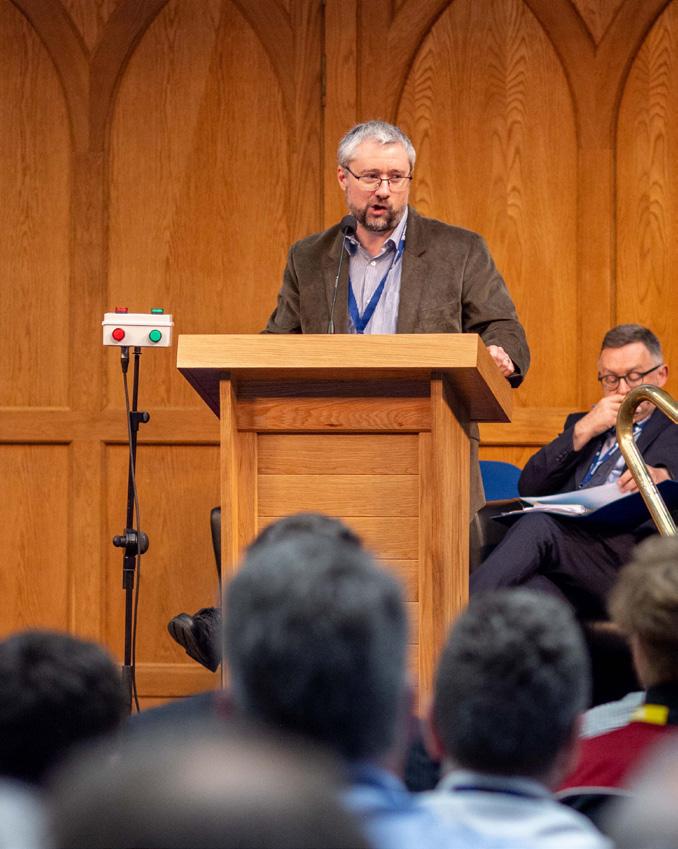
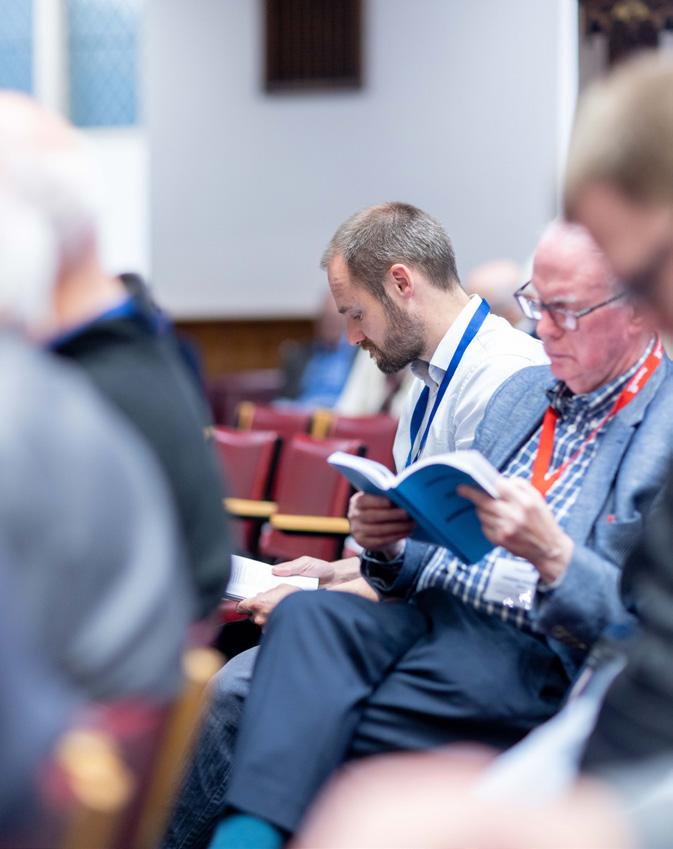
Over the last number of years, the General Assembly has seen increasing numbers of Memorials, or requests from outside of the Assembly, come before it.
This year, the General Assembly agreed to Memorials to change the name of a Bangor congregation, give permission to a presbytery to establish a new congregation, to look at the role of ministers and to relook at the biblical office of deacons within the denomination.
The Armagh Presbytery Memorial asked the Doctrine Committee to look at the specific role of the minister. Ordination was felt to be a unique indicator of a special role to preach and teach in a congregation, but within a Church that believes in ‘every member ministry’, others, such as Accredited Preachers, can also preach. The presbytery was essentially asking for a clarification of the role of an ordained minister to the office of Word and Sacrament, as distinct from any other role. The Memorial also made clear that its focus was not about gender in ministry.
The Assembly resolved to accept the Memorial, combining it, however, with the request to relook at the office of deacon to be considered by an Ad Hoc Panel and not the Doctrine Committee. An amendment brought by Armagh Presbytery opposing the joining of the Memorials and referral to an Ad Hoc Committee was defeated.
You can read Armagh’s Memorial on page 179 of the Blue Book, with the resolution on page 299
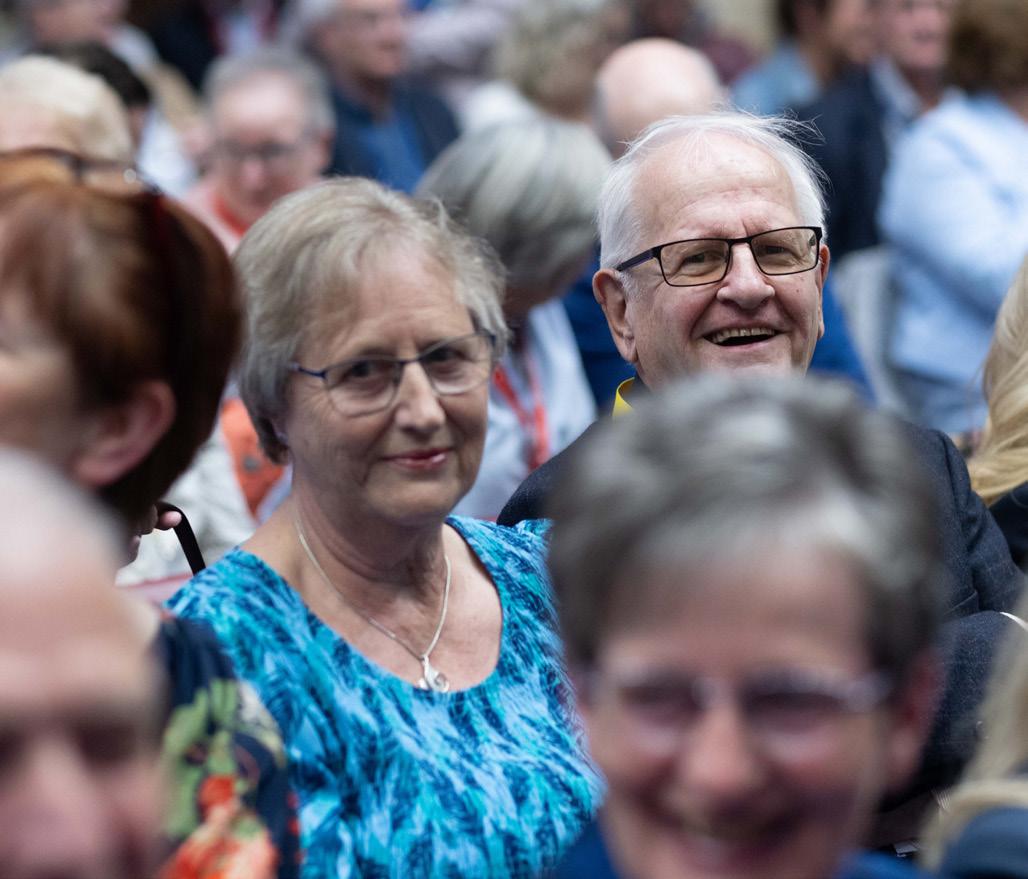
As part of the report from the General Assembly Advisory Committee, Very Rev Dr David Bruce, convener, brought the report from the task group on the admission to baptism of children of unmarried parents to the General Assembly, as requested by the Monaghan Presbytery at the General Assembly in 2024.
Dr Bruce thanked the Rev Gordon Best and the task group for all their work. In summary the task group’s recommendations were: that in all difficult and complex cases of requests for baptism, the minister should bring the matter before the kirk session for consideration and decision; that children of unmarried couples should normally not be baptised, unless there are clear, exceptional circumstances and that pastoral sensitivity should always be shown while engaging with unmarried couples seeking baptism for their children, with a view to encouraging them towards Christian marriage.
The General Assembly, following some discussion, accepted the report.
The task group’s full report and detailed recommendations can be on pages 79 – 81 of the Blue Book.
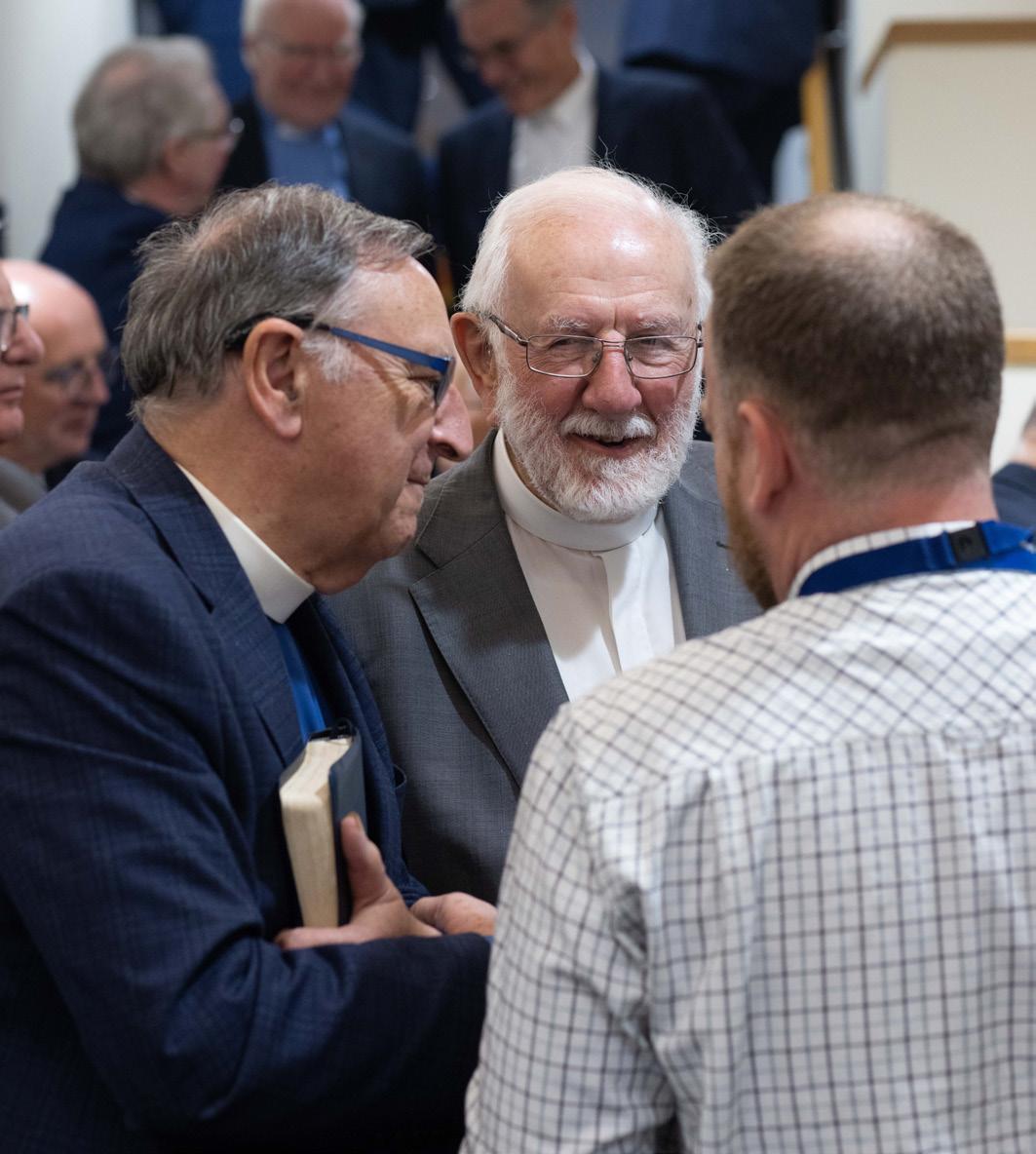
The Council for Global Mission’s report showed that congregations across Ireland contributed £427,465 to the 2024 World Development Appeal (WDA), PCI’s annual appeal which supports life-changing sustainable development projects in some of the poorest communities and disadvantaged places on the planet.
Delivered by PCI’s relief and development partners, Tearfund and Christian Aid Ireland, congregational donations are collated centrally, with five per cent of the total raised given directly to PCI’s partner churches and organisations around the world. The remainder is then divided equally between Tearfund and Christian Aid Ireland to support numerous projects around the globe.
This year, the General Assembly agreed to a change in this process due to concerns raised
One of the significant moments of this year’s General Assembly was the formal approval of the “Affirmation of Fraternal and Confessional Relations between the Presbyterian Church in Ireland and the Evangelical Presbyterian Church (USA)”.
Discussions have been ongoing between the two churches for a number of years and the passing of this resolution, with a similar resolution being passed by the EPC (USA) at their General Assembly in Detroit, formalises our relations.
The outworkings
by some presbyteries, regarding the publication of ‘Queering the Women, Peace and Security (WPS) Agenda’. The research paper was funded by the British Academy and involved input from Christian Aid, with the research and authoring team led by a Queen’s University Belfast academic. The paper was published on the websites of Christian Aid in Great Britain, and Queen’s.
Given subsequent concerns raised, as an interim measure, the Assembly agreed to allow congregations, if they so desired, to specify which relief and development partner should receive their donation for the 2025 Appeal. Furthermore, that no differences in the amounts allocated would be ‘made up’ centrally. The Assembly also agreed that there will be further consideration as to how best to proceed in the coming months.
Further information can be found on page 6163 and 83 to 87 of the Blue Book.
include appointing representatives to attend respective General Assemblies, enabling opportunities for exchange visits and educational cooperation, the mutual sharing of published resources and the possibilities of short-term mission team visits.
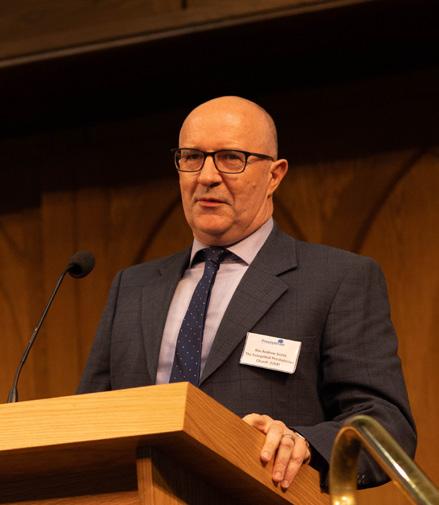
Rev Andrew Smith, brought greetings from the EPC (USA) to the General Assembly and in his address spoke of the similarity in both church’s visions. He pointed out that one of the EPC (USA) missions is to encourage each of its 600+ congregations to plant a new church, to partner with other EPC churches in planting new churches and provide financial support for those new


churches, similar to PCI’s Council for Mission in Ireland project ‘10 plus 10 in 10, a decade of church planting’.
The outgoing Moderator, Dr Richard Murray, warmly welcomed Andrew and the new relationship, and PCI’s new Moderator Dr Trevor Gribben, attended the EPC (USA) General Assembly in the third week of June.
If you missed the General Assembly, The Review will give you a flavour of what took place in the Assembly Hall last month. For the Blue Book, which contains all the reports and resolutions debated, plus the Supplementary Reports, news stories, videos and the recorded live stream of the worship and discussions that took place, visit the General Assembly Hub: www. presbyterianireland.org/ga25